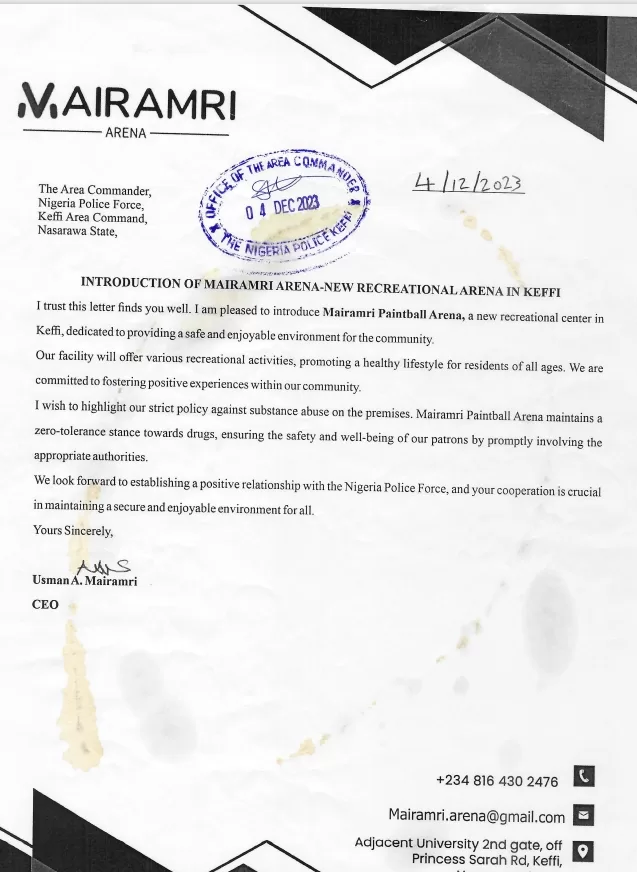It was a calm June evening in Keffi, North-central Nigeria. The last rays of the setting sun bathed Mairamri Arena, a local recreational centre, as the hum of laughter, the sharp clatter of snooker balls, and the rhythmic pops of paintballs filled the air. The aroma of frying food wafted from the kitchen, mingling with the energy of nearby Nasarawa State University students unwinding after a long day.
For Usman Abubakar Mairamri, the CEO of Mairamri Arena, it was business as usual. But the calm was shattered when police officers stormed in. “I was at the arena when three policemen came in by 6:32 p.m.,” recalled Usman. One officer stepped forward, asking casually to play a game, his eyes fixed on the paintball area. However, before Usman’s staff could respond, two more officers joined in, suggesting that the paintball marker was a weapon. “I said ‘no’. It is not a gun. It is a marker. It just shoots out the paint. And it is a game,” he explained.
Usman says despite his clarification, they insisted on taking him away, claiming the Keffi Area Commander wanted to see him. What started as an ordinary evening spiralled into a nightmare, threatening not only Usman’s business but also the livelihoods of his staff and their families.
The arrest and baseless accusations
The ride to the Area Command office felt bizarre for Usman as the events of the evening played over in his mind. “They said they received intelligence that guns were being fired,” said Usman, recalling the officer’s allegations.
He told HumAngle that he had taken the necessary precautions when establishing his business, including notifying the Area Commander’s office in writing. As they arrived, he pulled out a copy of the acknowledged letter, dated December 4, 2023, showing the commander’s official stamp. But it seemed that none of this mattered. The officers took one of his paintball markers without consent, presenting it as ‘evidence’.

When Usman was finally brought before the Area Commander, Assistant Commissioner of Police (ACP), Gbenga Olorunfemi, he was greeted with hostility. “Ah! What is this? A gun?” the ACP exclaimed, appearing to dismiss Usman’s explanation before he even had a chance to demonstrate that the marker only shot paint. His protests fell on deaf ears as ACP Gbenga accused him of using the Mairamri Arena to train people to shoot firearms. Usman believes he is a victim of police overreach and abuse of power.

His belief is not far-fetched, as ordeals like that are not uncommon. In Nigeria, allegations of police overreach and the abuse of power often happen, with reports of them frequently threatening the livelihood of small business owners and other citizens. The country’s entrepreneurs, already operating under significant economic pressures, are often vulnerable to arbitrary and unchecked actions by authorities.
“He [ACP Gbenga] then began to interrogate me on who rented out the land to us,” Usman recalled. Despite explaining that paintball and archery were legitimate recreational activities commonly enjoyed worldwide, including in major Nigerian cities like Abuja and Lagos, the commander was adamant. He confiscated the letter of approval, stamped by his office, that Usman presented.
By the end of the interrogation, Usman was told to return the following morning to give a statement—leaving him bewildered and anxious over a situation that had spiralled beyond reason.
HumAngle contacted the Area Commander on Aug. 13 and 14 for comments on the incident. However, until this report was compiled, he did not respond.
Intimidation, threats, and loss
By the next day, Usman’s frustrations had grown. ACP Gbenga’s first words to him that day, “How do you intend to solve this?” unsettled Usman, indicating the issue was far from resolved.
“In defence, I said that we don’t sell alcohol,” Usman explained, pointing out that a sign at the entrance prohibited the use of drugs and illicit substances on the premises.
However, the Commander appeared unconvinced, intent on shutting the business down. As the situation intensified, Usman’s decision not to vacate the premises contributed to the tension. The ACP Gbenga’s warning that anyone found on the premises would be “arrested and brutalised” left Usman deeply concerned.
The threat was not just empty words. Usman recalled that the immediate effects were devastating. Sensing the growing tension, customers began to leave, and four employees resigned that same day, fearing for their safety. The business that had cost him ₦16 million ($25,000, exchange rate as of December 2023) was now on the brink of collapse.
In desperation, Usman travelled to Abuja to seek help from a retired police commissioner, who immediately called the Nasarawa State Commissioner of Police to intervene. But while Usman was in Abuja, the Area Commander acted further against him.
“While we were just opening the arena, the Area Commander drove in with two of his boys,” Kabir Alhassan, Manager of Mairamri Arena, recounted. “He then started filming the business location while stating that ‘this is where terrorists are being trained’.”
According to Usman, no formal case file had been opened, and he was unaware of any investigation being initiated at that time. “He [ACP Gbenga] claimed that what prompted him to come to the business area was a security meeting at the Emir’s palace in February 2024. And that an officer of the Nigerian Security and Civil Defence Corps told him that guns were being shot behind his office, and he had not done anything about it as an area commander,” he said.
Before the incident, Usman’s business had been thriving. “On a good week, we could make a profit of over ₦300,000 ($182) from the games. And combined with the restaurant, we could make ₦500,000 ($300),” he explained. But now, with the police’s threats hanging over the Arena, the business has become weak. The loss of income was not limited to Usman alone. Many of his staff were students from the local university who relied on their wages to fund their education. As the harassment continued, they were left stranded without a source of income.
“That place was my only sustenance in Keffi,” Esther Ishaku, the Head Chef at the restaurant, said. She had supported her two younger siblings through her earnings from the restaurant, but she could no longer provide for them after the business shuttered. “I loved working there. Now, I am left with nothing.”
Esther’s story mirrors that of countless others whose lives were disrupted by the ripple effect of the ordeal.
A desperate fight for survival
As the reality of the situation sank in, Usman wasted no time in defending his livelihood.
On June 8, he formally petitioned the Nasarawa State Commissioner of Police, outlining every detail of the ordeal. His hope was to initiate an investigation and clear his name.
“On June 12, 2024, I received a call from the Nasarawa State Nigeria Police Force Criminal Investigation Department (FCID) to come to Lafia, the state capital, to give a statement which I did,” Usman recounted. The FCID promised to set up a meeting for interrogation between him and the Area Commander, but the Commander’s absence at the first scheduled appointment fueled Usman’s growing frustration.

Meanwhile, word of the incident had reached his landlord. Usman soon found himself in an even more precarious situation when the landlord, citing a “security report,” ordered an eviction. Despite his attempts to seek clarification, a lawyer’s letter on June 21, 2024, stated that the Area Commander’s influence had cost him his reputation and place of business.

“My lawyer then responded in writing that the content of the letter was not explicitly clear and requested them to explain what they meant by nature of business and categorically state the name of the area commander that influenced them to evict us. We are yet to receive a response,” Usman told HumAngle.
HumAngle contacted Muhammad Wada Yahaya, the landlord, and Kasimu Abdullahi, the land’s caretaker, via phone calls and text messages on August 13 for comments regarding the incident. However, as of press time, no response has been received.
Although the FCID transferred the case to ‘state-level authorities’ and eventually allowed Usman to resume operations, the damage was done. Fear and distrust had settled in. His staff continued to resign, customers stayed away, and the once-thriving business was on the brink of collapse. Usman has now decided to shut down and pursue a different venture.
“The business is not moving, and our properties are getting stolen because we could no longer pay our security guards. So, we have decided to pack out and close the business there. The landlord has agreed to refund our money for the remaining three months. My rent expires in November. So, we could use that to rent a little space elsewhere and start a different kind of business.”
